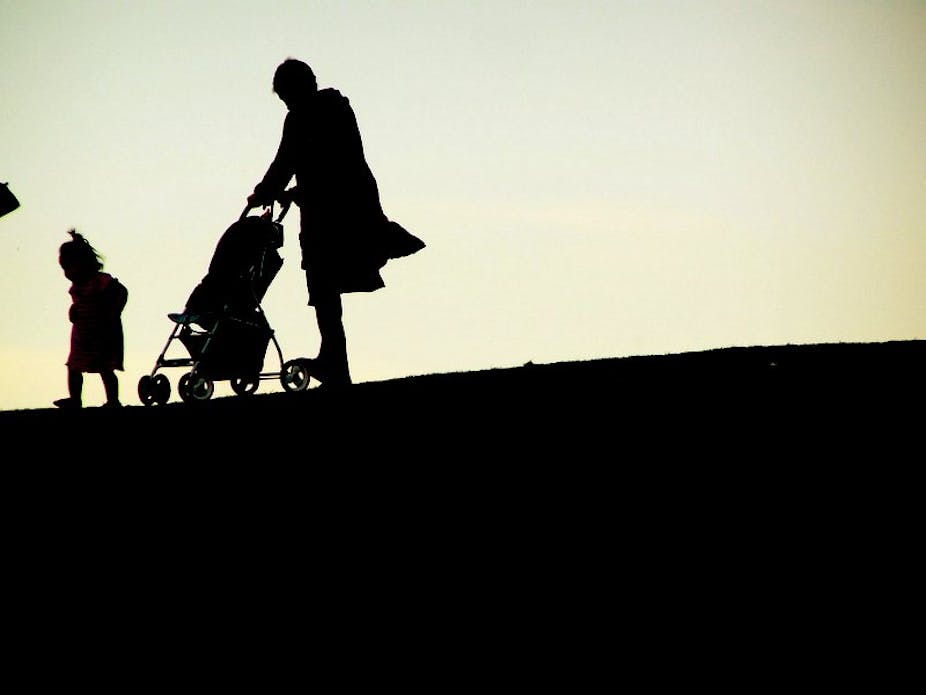Becoming a parent is a journey into unchartered waters – the physical and emotional demands of looking after a newborn are exhausting and constant. Not surprisingly, depression and anxiety are common among both new mothers and fathers but, for some, depression may come later.
Most research about maternal depression has focused on pregnancy and the first 12 months after birth (the perinatal period). But counter to the prevailing view that this is a peak time of vulnerability to depression, women may be more vulnerable to depression as their children get older.
In a recently published paper, my colleagues and I show one in three women report depressive symptoms between pregnancy and four years after the birth. And that the proportion of women experiencing depressive symptoms is higher among mothers of four-year-olds, than among mothers with a newborn baby.
We recruited 1,500 first-time mothers during the early part of their pregnancy from six Melbourne public hospitals, and had them complete questionnaires and do interviews about their health and well-being from early pregnancy to four years after childbirth.
Our results raise questions about whether current models of mental health surveillance and primary care for mothers actually meet their needs.
Current efforts
In 2008, federal, state and territory governments committed $85 million over five years to fund the National Perinatal Depression Initiative. The money was used to improve detection and support for women experiencing depression and anxiety in pregnancy and during the first 12 months of their child’s life.
National guidelines recommend routine assessment of women’s mental health and well-being during pregnancy and the first three months after birth, integrated into regular check-ups in antenatal and early postnatal care.
But our research shows many women experience psychological problems well beyond the perinatal period. Indeed, we found 15% of women reported depressive symptoms when their first child was four years old, compared with 8% in the first three months after giving birth and 9% in early pregnancy.
At first, we thought the birth of a second child and additional stresses of caring for two, and sometimes three, children would explain our findings. But this turned out not to be the case.
Almost three-quarters of women in the study had a second child by the time their first child was four, but depression was more common in women who didn’t have another child. In fact, 23% of women with one child reported depressive symptoms, compared with 11% of women with two or more children.
Getting it right
Clearly, the key lies elsewhere. A greater proportion of women with only one child had experienced emotional and physical abuse by an intimate partner, and other kinds of social adversity, such as separation or divorce, death of a family member or financial hardship.
Understandably, all these adverse life experiences had a detrimental impact on their mental health. But more disturbingly, a staggering one in five women in the study experienced abuse by an intimate partner in the year after giving birth to their first child. Sadly, abuse did not decrease as the children got older.
More than one in five women (21%) reported emotional and/or physical abuse by an intimate partner in the 12 months preceding the four-year follow-up. It’s not surprising that mothers experiencing intimate partner abuse and other kinds of social adversity are much more likely to be depressed.
The National Perinatal Depression Initiative has greatly increased awareness of the high prevalence of maternal depression and anxiety during pregnancy and the first few months after birth. But efforts to improve maternal health need to extend beyond this period.
There’s an urgent need to re-think current models of maternal health surveillance and primary care support. Primary care services need to remain attentive to the high prevalence of maternal depression among women with pre-school aged children, and target resources to those at higher risk of mental health issues, such as women experiencing violence.
Services also need to ensure women who have only one child or a long gap between pregnancies receive appropriate primary care and support in the early years of parenting.

